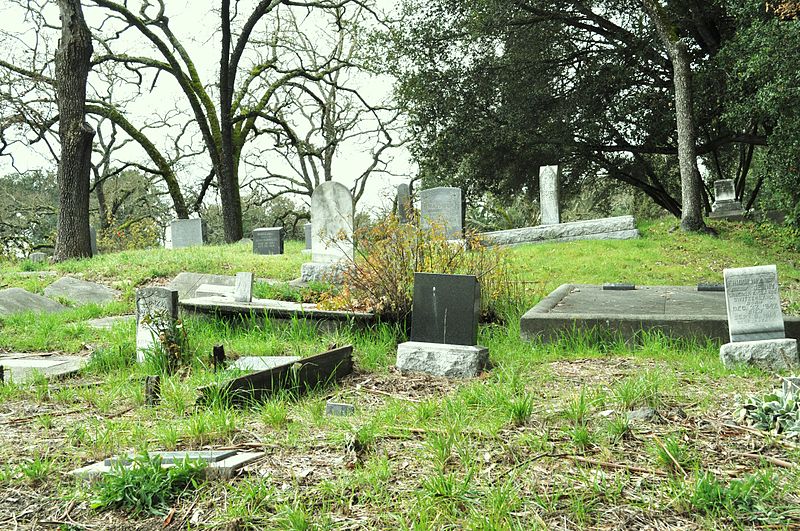.
My name was... oh, what’s the difference? I came
from... really, who cares where? Was born, raised, educated
no doubt, in some fashion... does this interest anybody?
And as to how I lived... we won’t go into that. At length,
I died. Here I lie. That’s the one relevant fact.
Santa Rosa Memorial Park: photo by Courtneylovephotography, 2010

Tom,
ReplyDeleteMaybe not "the one relevant fact" -- what about these words?
4.14
shape of grey cloud above shadowed plane
of ridge, golden-crowned sparrow calling
in foreground, waves sounding in channel
thinking of “present itself,”
thought of that which
is present itself, trace of
it, specific occasion
silver line of sun reflected in channel,
whiteness of gull flapping toward ridge
if the corpse rises
ReplyDeletethe factoring can begin again
revenant fact
zombi interlude
lem 747
some people ´s last words are written on the grave...I have known interesting stories in those places...!
ReplyDelete“I died. Here I lie.” is quite good because epitaphs, like newspaper headlines, do need to be short and pithy. I remember being very moved when I picked up the Ted Berrigan tribute volume to read about the epitaph, “Nice To See You”, which I thought was great. My mother was very gifted at choosing epitaphs. It’s an unusual talent, but you’re glad someone has it, even though the issue of relevance does loom large at moments like that. When she passed away, we were both reading Aurelia by Gerard de Nerval and selected as her epitaph, “My imagination gave me infinite delight”. We thought that was appropriate.
ReplyDeleteA small tree,
ReplyDeletethat will grow.
No epithaph.
Seed for squirrels,
and a warn drey.
or warm even.
ReplyDeleteI'd rent that
ReplyDeleteTom...
ReplyDeletethis just cuts deeeeep...
but even that is not a relevant fact... i don't care where the body of a loved one lies...
the only relevent fact about one we love is the memories...
.
memories
have a heart
beating hard
in the realm of nothings
.
hmmm... and i think of the time when i'm dead...
ahhh....
Well... the inner pedant requires an admission here. Let it be noted that this post is not merely an indication of a morbid preoccupation with death.
ReplyDeleteNo, the preoccupation is merely realistic.
No, strike that last sentence.
The poem is actually an approximate translation of a poem from the Greek Anthology. The author of that Greek poem is Paulus Silentiarius (Paul the Silentiary).
Paulus held the office of "silentiarius", usher and officer responsible for keeping the peace, at the court of Justinian. He died c AD 575. Among his eighty-one poems in the Greek Anthology (they were doubtless collected by his friend Agathias, the sort of friend every poet ought to have), forty deal vividly with love, and another twenty with works of art. Paulus was an early exponent of Ekphrasis. His ekphrastic poem describing the restored church of St Sophia was declared by the great Homeric scholar Wilamowitz the last triumph of the high style of Greek epic poetry. For all these dry and dusty reasons Paulus Silentiarius remains dear to the heart; I bow to him, for his poetic remains shall outlast, if not perhaps Time, then certainly mine.
Well, it's a wonderful piece of work (yours). Is there a citation you can possibly provide to the original (in a less artful, I expect, English rendering)? I've waded into the research, but would appreciate a guide's expert assistance.
ReplyDeleteWhat an excelent post, there is nothing that can be added to it, the picture and the texts says everything life after death.
ReplyDeleteThank you very much, Mariana.
ReplyDeleteCurtis, downloadable files of the Loeb edition of the Greek Anthology can be found multiply posted here.
Paul the Silencer is indeed in there, with his epitaph to let.
Is death is an event? Ordinary?
ReplyDeleteIt is a lovely poem. Relevant indeed.
Aditya,
ReplyDelete'Tis upon your inspiration that the old ghost has found a breath of life and wafted forth from the mouldering ground for a last day in the sun...
And not even that... here lies the body, but who knows where the soul might be... =)
ReplyDeleteLucy,
ReplyDeleteDoubtless departed long since, had it any sense?
can I have permission to translate this poem into the second largest spoken languages of India... Telugu?
ReplyDeleteDear Mr Murty,
ReplyDeleteYes, permission is granted.
Or perhaps it's Ms. Murty? -- in any case, all the same to me.
ReplyDeleteThank you Tom Clark. I posted thetranslation in my blog today and here is the link: http://teluguanuvaadaalu.wordpress.com/
ReplyDeleteThank you very much for both the excellent poem and the permission to translate and post it in my blog.
best regards,
Mr. NS Murty
And thank you, Mr Murty.
ReplyDelete